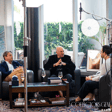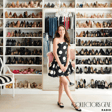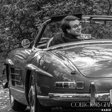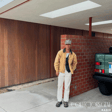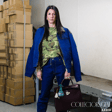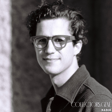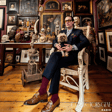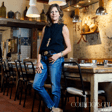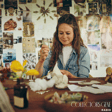Introduction and Personal Fulfillment
00:00:00
Speaker
One thing that I feel like collectors have in common and that really has made my job so gratifying is that I love seeing other people get excited. I am fundamentally an enabler. So if someone else is like, oh, that is exactly what I've been looking for. I i find that very contagious. And so I love that feeling. I'm chasing that feeling pretty much on a daily basis. And I am trying to evoke that feeling in others professionally.
Meet Rebecca Romney: Rare Book Specialist
00:00:31
Speaker
What's going on everybody and welcome to collector's gene radio. This is all about diving into the nuances of collecting and ultimately finding out whether or not our guests have what we like to call the collector's gene. If you have the time, please subscribe and leave a review. It truly helps. Thanks a bunch for listening and please enjoy today's guest on collector's gene radio.
00:00:55
Speaker
You may recognize today's guest as the rare book specialist, dealer, and collector from the hit show Pawn Stars, Rebecca Romney. Rebecca got started in the world of rare books quite haphazardly when she applied for a managerial position at age 23 for a rare book retailer. And you can pretty much guess what happens next. Rebecca is one of the most respected dealers in the rare book space with her company, Tight Punch Matrix. And she's also the co-founder of the Honey and Wax Book Collecting Prize. She sold and handled some of the rarest books in the world like Shakespeare Folios and first editions of Newton's Mathematica. We dispel the myths of how books should be handled and chat about the diligent and detailed process of buying and cataloging entire libraries. In such a subjective space, Rebecca has not only made a name for herself, but as a trusted source in the industry who is willing to always point clients in the right direction. So please enjoy. This is Rebecca Romney for Collectors Gene Radio.
00:01:51
Speaker
Rebecca, welcome to Collector's Game Radio. Thank you for having me. It's my pleasure. So for those that don't know, you're a rare book dealer, appraiser, author, collector, and this all kind of started in, is it 2007? Yes, that is when I got into the rare book trade entirely by accident. I just applied for a want ad thinking it sounded like a cool job. And that was at Bowman Rare Books, is that correct? Yes, Bowman Rare Books. They are a company based in the East in Philadelphia, and New York, and they were opening up a new gallery in Las Vegas. And Vegas is where I was based. And so I was part of the cohort that opened that gallery.
00:02:32
Speaker
Amazing. What was that time like in 2007 for Rare Book Collectors? Well, even saying 2007, I think you have an idea of what happens next, which is 2008. right So we you know we were onboarded in late 2007 and early 2008, we were finishing up our training. We opened very early 2008. So we were open about six months before the recession hit.
Diving into the Rare Book Market
00:02:59
Speaker
And so we had you know sort of six glamorous months of of being very busy.
00:03:04
Speaker
And then Vegas was one of the hardest hit cities in the United States because construction, for example, on the Strip just stopped. And so many jobs in Las Vegas were ah based around the Strip that was having sort of this major recession. And so it did really change what the day-to-day life was like in Las Vegas. But the interesting thing about Vegas is that it does have its own rhythms, aside from whatever else is going on. So people say, oh, Vegas is just a desert, so it's summer all the time. But we have our own seasons.
00:03:37
Speaker
So in the Vegas gallery in January, we had the Consumer Electronics Show. And every year when CES would come in town, people would come into the gallery and they'd ask for Charles Babbage and Alan Turing books. And then there would be a gem convention in town and they'd come in and ask for books on diamonds and minerals. And then there would be you know a conference about a certain type of law and they'd be asking for law books. And so you would start to realize year after year that you would have it have its own rhythms because Las Vegas isn't just a party tourist town, it's also a conference center. And so even with the recession and the type of changes that affected to the luxury market, there was a reliable market from other types of workplaces.
00:04:20
Speaker
Interesting. yeah i i Yeah, I guess a lot of people never think of Las Vegas as this city that you know is really year round, regardless of of the pool parties and DJs and whatnot. I mean, it is conference city there. I mean, but you know for for where we are, ah you know I'm based on the West Coast too between Los Angeles and Vegas. I mean, those are probably the two biggest cities that have the most conferences. Yes. And so many times people would stumble into our space and they'd say, oh, this is a breath of fresh air because they weren't coming to Vegas for the gambling. They were coming for work. right And we, I mean, we certainly did have gamblers who purchased too, but the environment was a little bit more diversified, I think, than people realize. And that helped us during, say, 2008.
00:05:08
Speaker
And so now you have your own rare book firm, Type Punch Matrix, and was that always the plan when you started getting into this industry in 07? It wasn't my plan initially. I think initially I was just shocked to be part of it at all. i i I didn't expect to get into this job. I really thought when I was applying for it that I was not qualified. and ah The story I always tell about this is that I almost didn't apply at all, but my mother said, don't pre-disqualify yourself. You should actually go through the motions and they can disqualify you if you think they think you're not qualified.
00:05:44
Speaker
And it turned out that I had all these ideas in my head about whatever a book dealer did and what expertise they had and that those were incorrect assumptions and I did have the qualifications they needed.
The Art and Science of Book Dealing
00:05:56
Speaker
A great example of that was I i was just very widely read because I've always been a reader. And they were giving us a lot of pop quizzes during the interview process. And they gave us a pop quiz related to Paradise Lost, John Milton. And I had read that for fun the year before, so I could talk about that. And they gave us a pop quiz about James Joyce's Ulysses. And I literally had a copy of Ulysses in my bag at that moment because I thought, well, you know, I'm unemployed. What's a better time to tackle a notoriously difficult book than when you're unemployed? Right.
00:06:29
Speaker
So instead, it got me employment. And so it turned out I was, in fact, qualified. And for a long time, it was just an extended apprenticeship, because that's what I didn't know, is that there is no degree in becoming a rare book dealer. The way you learn is by in-person experience, by handling the book. It's sensory data. And this is something I think a lot of collectors appreciate, which is that you're you're thinking about these the books as objects, as historical artifacts. And that means you're looking at them very differently than the type of knowledge you might glean from reading about them. And there's really no way to fast forward that experience. You just have to do it. And so those early years, they're very much an apprenticeship. I was learning from some of the best and most experienced people in the trade. I had them, you know,
00:07:16
Speaker
helping me figure out what I should be paying attention to. Notice how this book tends to fray a lot at the spine. This book had really poor paper, so it tends to get foxed. You just start learning by observation by doing. And it was it took a while for me to finally go off on my own. And a lot of it was not because Bowman wasn't an amazing place. It was I got an incredible training there. but really just came to you know wanting to pursue my own tastes, my own interests. I think collectors understand this where you know you can appreciate other people's collections and other ways other people's approaches, but fundamentally, it's about your taste. and Having my own company allowed me to determine things according to my taste. and At what point did you start collecting for yourself?
00:08:05
Speaker
Oh, this is a great question because I initially really tried to avoid it. It's impossible. it is i know as you'll You'll be drawn back to it inevitably. you know I had certainly had little collections of things growing up that were very incidental. I didn't even know I was collecting kind of thing. and it was When I was in my early years of apprenticeship, I specifically did not collect because I felt like that was a conflict of interest. I didn't want to be tempted to buy something that was coming in and then never get a paycheck, essentially.
00:08:38
Speaker
So there was there was some kind of practical balance there. I thought that's just not a good idea. And then I didn't truly start collecting in earnest until I had a lot more control over how I handle that, the taste equation. So I was looking for books for my firm and I found something that I initially bought for the firm that I was going to buy and catalog and sell. And then I got it and I started cataloging it and the further I got into it, I just realized I couldn't sell it.
00:09:15
Speaker
Do you have it still to this day? I do. I do. It's a copy of Ursula K. Le Guin book. It is one of her Earthsea books and The Farthest Shore, and it's the copy that was owned by her agent, Virginia Kidd. And I initially knew that it was owned by her her agent. I wanted that association copy. But as I did the research on it, I learned that Le Guin really put a lot of her success at the feet of Virginia Kidd, specifically, you know, Larissa Le Guin was working in the sort of science fiction pulp tradition, which was, you know, very separate from quote unquote mainstream literature. And Virginia Kidd was the one who introduced her work to publishers outside of the science fiction pulps and paperbacks and into hardcover and was therefore one of the main people who
00:10:10
Speaker
made Le Guin mainstream. Fascinating. So this is all things that I learned after I got the book in hand. And you can see that, I mean, maybe you can hear it in my voice, I just increasingly thought, oh, this is way better than I realized. The smile kept getting bigger. Yes. And so I decided I would keep that, but I didn't consider myself a collector at that point. One book, I think, in my opinion, does not make you a collector, but the second one does. Absolutely. So that was what happened. is There was a second time where it was another, it was a science fiction association copy. um It was a copy of a book that I was really interested in called Native Tongue by Suzette Hayden Elgin. This was a woman who was writing science fiction to put herself through graduate school as a linguist. And my undergraduate degree was in linguistics.
00:10:56
Speaker
And so she was writing these science fiction books that were really informed by linguistics. And ah this copy of Native's tongue was sent to James Tiptree Jr., who was a really famous science fiction author. And at that point, not out as who she really was, which was Alice Sheldon. Everyone thought she was a man. And so this was an advanced copy that was sent by the editor to James Tiptree Jr., hopefully for a blurb, you know, with a little um a specific say, hey, I hope you like this, you know, let us know what you think. Sure. And I found that on eBay with absolutely no attention to how important it was, because those were two names that if you're not in science fiction circles, you just don't know them. And I found it for what I call the price of lunch. Those are the best finds.
00:11:47
Speaker
Exactly. and i And I bought that. I knew it was a steal. And again, I thought, you know, this is something I can resell, but I had it in hand and I just thought I can't sell it. So now I had two Science Fiction Association copies that I couldn't bring myself to sell. And I thought, well, I guess that's what I collect. Has what you were collecting in the beginning evolved at all to what you collect today? It has evolved, but only in terms of expanding into different types of collections. So, you know, I tend to be really picky in my collections. So, for example, doing a science fiction association, particularly focused on um feminist science fiction writers, um what that means is those copies don't come up that often. And so I might be searching and searching, but
Challenges in Sourcing Rare Books
00:12:33
Speaker
it might be, you know, years until something comes up that's right. And so in the meantime, I'm still, you know, I'm still a hungry hunter. Right. so
00:12:42
Speaker
I need other things to keep me fed. And so I start different collections. And each one of those has their own parameters. So though I have probably, I don't know, half a dozen different collections. Right. They're all very tight parameters, but um that tightness kind of keeps that challenge alive and extends the process. But because it's extended, I have all these ones to sort of balance it out when one is really rich and there's a lot there, another one might be kind of percolating. Sure. So you've sold some incredibly rare and valuable work such as you know Shakespeare Folios and Newton's Mathematica. How do you source these and what's your approach to you know valuing such iconic pieces? Yeah, so this is I think a great question because people are right to think that it's difficult.
00:13:33
Speaker
In my job as a real book dealer, there are essentially three stages. There's purchasing, cataloging, and selling. And each one of those is very labor intensive because you'd think that the buying would be the easy part and the selling would be the hard part. But in fact, I can't manufacture my product. I have to find it. So you what happens in my business is you'll get wantless from collectors. They're looking for specific things. And you might have a major sale waiting in the wings if you can only find that thing. right So I spend you know about a third of my my time every week, third of my day looking for books.
00:14:13
Speaker
And I have to cast a very wide net. So I certainly scout on the internet. I monitor auctions. We get a lot of people who write us directly when we have a books for sale page that explains how to do that so we can go through those inquiries very efficiently. And we also work with individuals. We love to buy private libraries, big collections all at once. ah We sometimes buy from other dealers. Essentially, anything can be anywhere and you always have to be looking. And I say, if you don't like the hunt, you would be a terrible rare book dealer because you have to love it because you spend too much time of your work time just hunting.
00:14:57
Speaker
hundred percent what What are the challenges you know when you're dealing with such rare books like this? Obviously, you know making sure that whoever has it is handling it probably with the proper care to make sure it gets to you and that you got to get it to the client. and Yeah, I think a lot of that becomes pretty clockwork when you've done it. but you know We have an entire little instructional PDF that we send to people when they have material that they're sending to us in order to know how to wrap it because people are worried. They want to make sure they're handling it carefully. So we do have systems in place for that type of thing. To me, the thing that is difficult is I think sometimes
00:15:35
Speaker
the difference between expectations and practicalities. So for example, if someone has a book I'm interested in, and I might make an offer, but I'll be very clear that my offer is pending in-hand inspection, because I can say this many, many times, have done Pawn Stars. It is very different to hear about a book or even see pictures of a book and handle it in person. There is a ah really good example. This happened in Pawn Stars a number of times. One of them was a copy of To Kill a Mockingbird that, you know, if you just looked at the front cover, they'd sent me a picture of the front cover in advance. You know, it looked fine. It looked very nice. And then when I saw it in person, it was an ex-library copy and part of the jacket was adhered to the book and it had so many issues with it that I changed. I had been planning to say it was maybe an $8,000 copy.
00:16:24
Speaker
I changed that to under a thousand from handling it in person. So you can imagine how the similar thing is going on with offers where I say, you know this is what I would offer assuming everything checks out as I think it will when I have it in hand. But if that's not how it looks when I get it in hand, then we need to have a different conversation. When there's such a discrepancy in the condition and the pricing, I mean, still a under $1,000 book is you know to a lot of people still very expensive and hard to fathom. Is that something that's still worth your time to say, but I'll still buy it for under $1,000 if you're willing to sell it to me because I may have a buyer.
00:17:03
Speaker
Yeah, for me it totally depends. I tend to associate, you know, what I handle is associated with my brand. And so if it's a condition issue and it's just not a nice copy in terms of collectible quality, then I may turn it down not because I couldn't make money on it, but because it represents my brand. So I am thinking about it from a business perspective as well, not just a, can I make a quick buck? But oftentimes when that happens, if it is something that's not for me, then I will refer to people who are much more, nope, just happy to, you know, if I can make a profit and everyone wins here, let's do that. That's also fine. ah That's generally what I try to do. I mean, you get this these kind of questions a lot of like, what's my book worth? Why don't you want it? And one of the main things I try to do when I am destroying people's dreams, which is part of my job,
00:17:50
Speaker
is essentially to give them the resource to keep going if they want to keep pursuing more information. you know No one likes a brick wall when you say, no, I don't want it end of story. And then they go, well, what am I going to do now? Right. And so instead I say, okay, well, you know this book is not going to fetch any money on the collectible marketplace. That doesn't mean it doesn't have personal value to
The Thrill and Strategy in Book Collecting
00:18:12
Speaker
you or it might have historical value elsewhere. Here are a couple of places you can check to see if these places might be interested. And if not, you have the answer that it only has you know personal value and you get to decide what to do with it. And so just giving people the information, I think often smooths the way when it comes to those differences in expectations.
00:18:32
Speaker
how How often do you get the opportunity to buy and source really rare books, you know, that are in mint condition, you know, kind of like these, you know, unicorn type books, how often do they come about? That's an excellent question. So it pens it depends on how disciplined I am. So there are certain collectors who are very disciplined in their collecting, and those are the collections you want. And oftentimes what it just means is that you will pay more for those collections because you want them more.
00:19:04
Speaker
And then you might have an opportunity to buy a collection, but it has, you know, it it's not not much of it is rare. The condition isn't great. And you could, again, you couldn't make money on it. But if you want to save your cash, you have to think about cash flow. If you want to save for when the great collection comes, you need to make sure you have the money for it. So maybe you pass on collections that aren't quite ideal while you're waiting so that you have the ability when that opportunity comes to jump on it. What's the feeling like when you do stumble across one of these just rare bird style books that, I mean, i mean you have to be ecstatic. Oh yeah. And I'm sure every every collector knows this feeling. It's very giddy. ah One of my friends talks about, he calls it the bounce. You know, for him it's a very physical sensation. ah if you You do feel it physically. It and does, it changes your pulse. you I think that it is very contagious.
00:20:02
Speaker
You know, I think that a lot of our loved ones might look at us sometimes and and not understand why we collect or aren't interested in what we're interested in. But one thing that I feel like collectors have in common and that really has made my job so gratifying is that I love seeing other people get excited. I am fundamentally an enabler. So if someone else is like, oh, that is exactly what I've been looking for. I i find that very contagious. And so I love that feeling. I'm chasing that feeling pretty much on a daily basis. And I am trying to evoke that feeling in others professionally.
00:20:41
Speaker
When you mentioned earlier that you were just cataloging this book and and you kept you know taking photos of it and looking through it and at one point you just realized that you had to have it and couldn't get rid of it. And I'm curious to know if there is that consistent struggle still of wanting to keep some of this rare stuff for your own personal collection or or if you're at the stage and you're collecting where you know what you're looking for and it's you know when it comes up, it comes up sort of thing. Yeah, this is actually one reason why the collections that I do build have very, very specific parameters. You know, I'm not just collecting any science fiction. I am collecting association copies only. I'm not just collecting association science fiction copies. I'm focusing on ones with some type of feminist writer involved. And those additional parameters make the chances that there will be a conflict less.
00:21:36
Speaker
Because I handle a wide variety of material, not just science fiction, for example. So even then on a daily basis, there's there's not likelihood that I'm going to be tempted. And then there are other things too. I have one collection that's these paperbacks from the 60s. And they're very findable but um they're not findable in great condition because they're from this era of the post war paperback boom where they were truly meant to be read like magazines, read once then thrown away. They were ephemeral by nature.
00:22:09
Speaker
and so That means even if they're red ones, they tend to kind of fall apart in your hands. so I could complete my collection just by titles very quickly, but I've added two parameters to it that make that trickier. One is that I won't spend more than $15 on a single book, so I've kept my parameters very, very low. It has to be a real find, and then also it has to be in fine condition, and that's even harder. and so Again, that both extends the process and makes it less likely that I'm going to conflict with my business because I might have paid more for it in my business or I might be handling lots of other paperbacks, but those are only ace paperbacks of gothic romances from the early sixties. So I have actually on my desk right now, some other paperback books from ace from the late sixties.
00:22:58
Speaker
And they're not gothics. So that's not a temptation to me. It doesn't fit my parameters. So that's kind of how I make the professional and the personal work is by having not boundaries, not so much in not being a collector, but boundaries that allow the collecting to be more fun while also not getting in the way of my daily life as a bookseller. I would have to imagine that book collecting and dealing is sort of a gift that keeps on giving, right? I mean, especially if you're reading these books that you collect and you get to touch and feel all these ones that are going off to other collectors. But I'm assuming if you're reading them each time you do, you kind of pick up on new things the same way. If you watch a movie 10 times, you you realize things that you didn't see the first time.
00:23:45
Speaker
Absolutely. and This is another way that you learn things from collecting that you may not otherwise. you know you You get a book in hand and you've bought it for your collection, but then you notice the ads in the back and you start reading about the other books that were published in the series at the same time. You say, oh I've never heard about that. Who's that author? and Then it sets you down another rabbit hole. you know and so it it is It is a sort of self-perpetuating momentum that is Very rewarding if you are inherently a curious person, if you just enjoy being curious.
Book Handling and Preservation Tips
00:24:19
Speaker
And I think that that's really what collecting and especially book collecting allows you to do because books cover every aspect of ah humanity. you know you You don't even have to be a reader, you don't even have to read like fiction in order to be a book collector. You can be interested in art, um architecture, IT, t you know ah biology, whatever it is that is your thing, you can explore it through books. And what happens is when you do that, you get a book in hand, it will set you off on a line that you wouldn't have discovered otherwise. It is a very organic way to build expertise in a subject matter and I often call it It's sort of an autobiography in the form of a treasure hunt Yeah, absolutely. I mean I you know you say that because it's it's interesting. There's a
00:25:05
Speaker
ah gentleman who's down the street here who has a fantastic car collection and every car and and Vehicle that he has is the oldest and first of its kind which is really really interesting and so he also has a Library of over 2,000 books that are all related to these specific cars old catalogs old operating manuals All these things because he works on them and drives them himself. Yes, exactly and So i I love when you know tangential collectors and collections kind of come to fruition based on the thing that you do love. here That's a good example. it It speaks to something we'll probably talk about, but that I've always seen is that if you have the temperament of being a collector, um then it's easy to kind of move between mediums.
00:25:55
Speaker
Sure. Yeah, we could always find places to spend more money, right? Exactly. You're you're drawn to the to the practice. You're drawn to the the sort of overarching appeal of it, and then you just find, you know, that particular thing to get obsessed with at this moment. But that doesn't mean that later on it won't be something else with a similar mechanism. What's the proper way to store and take care of these books? I mean, is it bad to stack them up right? Does it ruin the binding? That's a great question. so A lot of people are worried about collecting books because they are worried about how to care for them. But books were literally engineered to be handled, to be in our hands. And for that reason, there are only a few things that you have to do in order to make sure that you are properly caring for your books.
00:26:42
Speaker
um I'll mention very quickly two handling rules, and it'll talk about storage. With handling, there the two main rules are focusing on the weak points of the book, and that is the head of the spine, which is the top part of the spine. You know when books are on a shelf, and you you have that nice little nook right at the top of the spine, you think, oh, that'll just use that nook to pull this down. Well, that seems so convenient, and that's a weak point. If you look at a lot of older books, they have a lot of chipping right there because that's gotten pulled over and over and over again. So all you have to do instead is sort of pull the book from the middle of the spine or even pull from the back from way behind closer to the and inside of the shelf instead of pulling on that little nook. And that's literally 50% of your handling rules right there. We're already halfway through.
00:27:25
Speaker
Then the next thing is that the joints, which is essentially where the the boards of the binding meet the spine, those are the weak points. You just don't want to flop the book open or press it open. And this, again, is something that we can feel on how it's engineered. When you open a book and you start to feel pressure, like you're feeling resistance to how much it opens, that's when you stop because that pressure is going onto the joints and that's not good for the joints. And so you're it's different depending on the book. Some have very loose joints and you can open them pretty far, and others you can feel are tighter, and that is a very natural feeling. We we can tell that, but you don't have to be taught that when you're holding it. You can sense the tension. And so you just keep it within that tension and you're fine. So those are the two handling rules, along with you know handling them with clean, dry hands. You don't need gloves, for example.
00:28:14
Speaker
After the handling part, the storage part is pretty simple, too, in that, you know, we're not talking about the Library of Congress protecting the Declaration of Independence, which is, you know, in this old chamber, that type of thing. um What I say about books is that they are actually a lot like humans, which is to say they want um steady temperature. You don't want extremes, okay? You don't want to be in the sun all day. that will cause damage to the bindings. Just like We Get Sunburned, books can show toning from that. You also don't want high humidity. We don't particularly like the feeling of that. A sort of steady humidity is better. And you also don't want the extremes in temperature of it being very hot or very cold or going back and forth between them.
00:28:59
Speaker
which means that in most cases, the best place to store your books long-term is in your bedroom, your living room, your library. It is not in the attic or the garage. Those are some of the worst places that they can be. Instead, they should be where you live with them. that is essentially That's like an incidental positive, is having those books around you to live with them is, in fact, what is best for them as well. I feel like everybody listening to this can now be a ah book chiropractor. We know how to handle them properly, not ruin the joints. Yeah, it is it is much more straightforward. I appreciate that that feeling of people don't want to hurt the books. they are They are valuing them. And also, the books were engineered to be handled. And so if you're just paying attention to a couple small things like that, then you really don't have to feel any of that anxiety.
00:29:52
Speaker
You mentioned earlier that, you know, a lot of times you'll acquire a entire library and that sounds kind of like a fascinating aspect of your work. Could you walk us through the process of acquiring a library ah collection and and from initial assessment to final cataloging and sale?
Rebecca's Journey on Pawn Stars
00:30:09
Speaker
Sure. So when you're dealing with a large amount, you're actually applying a lot of the type of strategies I would do, for example, for an appraisal of a library where you have to kind of take these large counts and you have to break everything up into types. You know, how many of these books are truly rare? How many of these books are about, you know, maybe $1,000 in retail? How many of these books are $500 in retail and averaging out? um You have to kind of do these big assessments as a whole and you will do spot checks throughout because say say it's a collection of 10,000 books, you're going to have to make an offer on that without actually handling every single one of those 10,000 books. So how do you do that, right?
00:30:50
Speaker
So you're pulling your samples, you're going through, your're you're making sure you're putting like with like, and you're creating your assessment for it. um And the funny thing about being a bookseller is people don't realize how much physical labor is involved. Right. as As you might imagine, you know, when we're boxing up collections, a lot of these collections will be, you know, at least dozens of boxes, but sometimes hundreds of boxes. um We even kind of joke, we use what are called banker's boxes in this business, which are those boxes that have the handles built into them. Yep. And they're great because um unlike moving boxes that are so big that if you fill those with books, sometimes they're just too heavy to lift. um Banker's boxes are the right size where even if they're full of heavy books, they're pretty fairly liftable and the handles are built in. So you don't have to worry about it being all awkward. And the way they're put together, they won't ever really give out from the bottom. And so Banker's boxes are the standard unit of measurement essentially for ever a book dealer. Someone will say, Oh, what kind of collection did you get? they' And they'll be like, Oh, you know, it was an okay collection. It was 45 boxes. You know, and they're saying it's 45 bankers boxes and any other dealer will know exactly what that means. So you do your, your packing, you oftentimes a lot of dealers will have trucks or have to rent trucks because you are trying to, you don't want to ship that many books. It's just not cost effective. Um, so you'll take these long cross country trips with like you hauls and things unless you own a van.
00:32:16
Speaker
right And then when you get everything in, you have to go through and um figure out your assign your costs to the different books and assign your prices and do the cataloging. And the cataloging, you know what we do when we catalog a book is we are um not just saying you know what the book is, whether it's a first edition, but we are recording the physical properties of that particular copy. So you know there's an ink notation on page 88. That's what we note. And I always think it's funny when people worry about things like, oh, rare books being stolen and it's being sold on a black market and that type of thing. Because the fact of the matter is, it's our job not just to describe that book in general, but to to identifiably describe that copy.
00:33:01
Speaker
Right, right. Down to the minutia of, you know, little marks on a page. Exactly. So we have an incredible amount of detail that applies only to that copy that is documentation of it. It is like one of the most documented types of things that could possibly be stolen. um It's much easier to distill a laptop. Right. So we're doing the catalog description and we're describing the particulars of that that copy in front of us. And after we have done the description, we have a record of the description. That's when we make it available for fit as a sale. We do our photography, we put it in a catalog, we take it to a book fair, we mention it to specific collectors. A lot of what we do, you know, this is fundamentally a luxury business. So a lot of what we do is relationship-based, very high-touch,
00:33:47
Speaker
you know people that we work with very closely over years. So a lot of the time when I'm buying collections or buying books, I'm thinking about the collectors that I work with and what they're looking for. And that will affect things like my offer. you know I will pay more for books that I know I can sell quickly. Also, once I have cataloged it, then I am picking up the phone or sending an email and saying, guess what? I have this thing you've been looking for. And that's a big part of my job. That's my professional enabler part that I love so much. ah So, yeah, it is. um Each part has its own little surprises, but all of those kind of work together in and in this cycle. Amazing. And you're also the book appraiser on Pawn Stars. How did this come about? Because that is such a fan favorite show, especially for any collector of any category.
00:34:33
Speaker
Yes, it was being in the right place at the right time. It was as simple as that. So when Ponce deux started, I was in Las Vegas and I was managing the rare book gallery where I had started a few years earlier. And we were the only rare book shop in town and I was the manager. And so we were the ones who got the call. I was at the time, you know, I was also working on the strip and it was about a 15 minute drive from where I was. So back then at the beginning, I would literally just drive down there, film, and then drive back and go right back to my shift, whatever was happening.
00:35:06
Speaker
And the thing that a lot of people perhaps don't realize is how similar that what I do on the show is to what I actually do in my regular job, which is to say, in my regular job as well, I have about two minutes to tell you why this book is important and explain why I'm putting the price on it that I am. Sure. And the only difference is that there are cameras there. and And now you're on TV. Yes. And then then it has this interesting echo effect. I'm sure, you know, there's a lot that isn't shown on the show, but is there a memorable experience you could think of as a rare book specialist where you couldn't believe what was in front of you or when something or when someone just had something truly special?
00:35:52
Speaker
Yeah. I mean, one of the things that got a lot of attention that I loved because I love handling it is um Adam, who you bring a lot of good material to the show. he was At the time, he was um sort of general antiques and he was doing a lot of scouting in books. And now he's a full-timer book dealer, Adam Weinberger. And you've probably we've seen him a number of times on the show selling books. He brought um a leaf from the Gutenberg Bible. And the Gutenberg Bible was essentially the first substantial printed book in Europe. um There was you know print technology ah far, far earlier in East Asia and China and Korea and Japan. However, um in Europe, the development of a print by movable type occurred in the 1450s. A guy named Gutenberg was the main pioneer of it, and he printed this massive Bible. And the Gutenberg Bible therefore has this ah sort of
00:36:48
Speaker
It's this iconic concept in what we think of as Western civilization. And today, there are you know a decent amount of surviving copies. Many of them are incomplete, though, and incomplete meaning they're missing leaves. And in the early 20th century, there was um it was like there were a couple dealers who had very wrecked copies that you know had survived fires and war and all displacement, all sorts of things, but then not entirely intact. So in the early 20th century, there was ah thing ah one dealer who put together essentially these portfolios and sold individual leaves because today you can't buy a complete Gutenberg Bible. you know The last one that came up for sale was 40 years ago, something like that. wow So they're just that's that's a holy grail. You're never going to get that. Institutions who have it, it's too iconic. They're not going to sell it.
00:37:44
Speaker
It's not going to come up on the marketplace. So if you want a piece of what is like the most iconic piece of print history in Europe, well, then you want a leaf from the Gutenberg Bible. And, you know, I've seen many Gutenberg Bibles complete copies, but the only way I can handle it myself is those these individual leaves. And so Adam brought one of the individual leaves um and you know it had some condition issues, but it was still a leaf from the Gutenberg Bible. It's just that special, right? Yeah, and the thing about the Gutenberg Bible is just so beautiful because Gutenberg wasn't just
00:38:20
Speaker
thinking about this innovation out of nothing, there was a mature marketplace for illuminated manuscripts. And if you think about illuminated manuscripts, these are very beautiful things or they can be. And so if he's going to compete in this space, he can't create something ugly. It has to be beautiful from the jump. And so when you look at the Gutenberg Bible or leaves from it, it is way more beautiful than it should be considering it's the first substantial book printed with moveable type in the West. Right. What is something like that valued at? So it depends on um what part of the Bible it's from. There's a premium if it's a book from the New Testament and particularly one of the Gospels. um A lot of the books from the leaves, like the one I did on the show, that was from the Old Testament from the Hebrew Bible.
00:39:09
Speaker
And it also depends on condition. It depends on provenance. ah When I was doing that that, that was probably, I don't know, 10 years ago now, maybe even less. But then that I think I valued that somewhere around 65, 75,000. Today, it's very hard to find one under 100,000. Wow. That is an expensive book. Yeah, and and not even a book, it seems just a single link. I've sold ones for more much more expensive than $100,000, one from the Gospels, that's more like $150,000. Yeah, it's an example of all those all those little details can have big big effects, but that's you know how it works in collecting.
Empowering Women in Collecting
00:39:52
Speaker
And just when you couldn't be any busier between your company and being on Pawn Stars, you are a co-founder of the Honey and Wax Prize, which if I understand correctly, you award people for having amazing collections. Yes, so I co-run a book collecting prize. And this prize, it's for women in the United States age 30 and younger. And a lot of people ask us about the parameters because they're so specific. You know, there are a lot of book collecting prizes um and they always have some type of parameters. Many are associated with universities. You have to be a student at Yale or something like that.
00:40:28
Speaker
um Some are geographically based, like the Tickner Prize is for collectors in the Northeast. um Some are age-based. There's a California prize. You have to be under 35. And so they all have parameters. And when we were thinking about the parameters for our prize, you know, I co-founded it with ah Heather O'Donnell, who's the founder of Honey and Max Books, which is where I was working before I founded um Type Punch Matrix. We were talking about what we wanted our parameters to be and the reason that we chose it to be women under 30 was because we were two women in the rare book trade that is
00:41:04
Speaker
It's a very masculine environment, which I don't have a problem with. I have two older brothers. I've always been a tomboy. I don't mind masculine environments by any means. And also only 20% of our membership, even less than 20% of our membership in the the nation's largest trade organization is women. And we would have people would come up to me and they would say, oh, you know, women don't collect. And I thought, that's not true. yeah think In fact, have you seen me on Pawn Stars before? so was It felt very much like a self-fulfilling prophecy. you know If a woman comes into your booth and you say, oh, women don't collect, so you're not going to go up and talk to her, well, maybe she's not buying anything from you because you're not taking her seriously. So there was this sense that, OK, people were telling us women don't collect.
00:41:52
Speaker
And then also, I'm unusual in the rare book trade in that I started almost right out of college. you know i I stumbled upon that job that position by accident, and I had just finished my bachelor's degree about a ah year before that. Most people come to rare books much, much later. The vast majority of our membership in this trade organization, I'm mentioning the ABA, is over 65. And so I was a baby when I started when I was 23. And I'm still a baby now, even though it's been you know many years later. And so the same thing would happen. People would come to me and say, oh, young people don't collect. Oh, young people aren't interested in books. I found it just fascinating that when I was working in the Vegas gallery, I would be 23 years old working in a rare book gallery. And people would come to me and say, young people don't like books.
00:42:41
Speaker
I'm like, who do you think you're talking to? Why do you think I'm here? The prize was meant to do two things. One, it was meant to provide evidence for the naysayers that these people do exist. The other aspect of it was to celebrate and provide specific support for them because based on the comments I was getting, it was clear that they were not getting support. Interesting. ah So yeah, so that's why we started the prize. And the thing that was great about it was that we we kind of started with these prescriptive ideas of like, we knew best. It was very, this is what we were going to accomplish. And then in the process, we just kept being surprised. These collectors kept submitting such interesting collections, just thinking about collecting in ways that we hadn't.
00:43:28
Speaker
And it became a much more reciprocal relationship. It wasn't just us awarding this you know these cash prizes every year, but us learning about what younger collectors were doing and how people were approaching it when they weren't part of the mainstream rare book collecting world and they were just doing things on their own. And it's become ah a real education for me as well as someone even as a judge to just see all the different ways that people overcome limitations and lean into their creativity and just explore whatever topic that they're into. Amazing. Are there common characteristics or themes among, you know, a lot of these really impressive collections that you've encountered?
00:44:08
Speaker
Hmm. I think the most common theme that I've seen is is twofold. One is curiosity, that instead of seeing something as, okay, well, that's end of story, I've learned that thing. Instead it leads to another question. Sometimes the second question is more interesting than the first question, right? So that that consistency in asking questions and being open to saying, okay, well, maybe there is more here.
Advice for Aspiring Collectors
00:44:32
Speaker
than I suspected. that Curiosity driving everything is a common thing that I see in great collections. But the other thing I see is related to curiosity, which is a flexibility and an adaptive nature. Because what happens is when you start collecting, we we have these ideas in our head, I'm going to do this. And then in practice, you run into obstacles. And so how do you react when those obstacles come up?
00:44:59
Speaker
You know, do you change your parameters? Do you adapt or do you say, well, I'm just going to hold out or I'm just going to stop collecting? And, you know, when you're talking about young people in particular. people who, you know, maybe they're students and they live in a dorm, they don't have a lot of room. Can you be a collector if you don't, if you have a roommate, you know, and you can't, you don't have any room? Well, you can. One of our the people who submitted in our earliest year, she was a student and she collected um these programs for tea ceremonies from Geisha and Kyoto, her entire collection, which was amazing, fit in two shoe boxes.
00:45:35
Speaker
You know, so even though she was moving around a lot as a student and didn't have a lot of personal space, she still found a way to collect. um And so that's the type of thing that you see that I find the best collections show is that they look at those limitations and they don't let those limitations stop them. They see those limitations as opportunities to get creative. Amazing. What advice do you typically offer to someone who wants to get into rare book collecting? I mean, I know it's so subjective to what you like or what your interests are, but is there, is there kind of a checklist that you go off of? Yeah. I mean, first, definitely collect what you like. Don't collect because you think you're going to hack the system and make a lot of money as an investment.
00:46:17
Speaker
The Wearbook Marketplace is a marketplace like anything else, and some people like to treat it like they're gonna play in the marketplace and hack it. But the fact of the matter is, this is fundamentally about the things that you care about. There are many better investments if you're just looking to get your money. The point here is because you love it. That is always my number one piece of advice so and that speaks to don't collect what you think you should collect. Collect what you actually care about that you're actually going to get that bounce when the when the package comes the thing that will give you that excitement and if you don't feel that way then maybe you haven't found the right thing yet so collect what you love.
00:46:55
Speaker
The next thing is that, you know, since it is a marketplace, they do advise people to collect what I call the best copy they can afford. Because when it comes to things like resale and how the marketplace functions, condition is one of the qualities that just doesn't go out of style. Great advice. Yeah. So that's paying attention to quality. And sometimes, you know, oftentimes a small collection of high quality is going to do much better for you than a big collection of middling quality, even if you spent the exact same amount between those two options. I love it.
00:47:27
Speaker
um so So yes, I do recommend um focusing on quality. if That is, again, if you you care about how the marketplace functions and you don't have to. you know the The first thing is what matters, which is like you don't have to care about what anything else is doing. It's just what you care about. What's your taste? What do you think is important? What do you want to be the caretaker of because you think that this should survive to the next generation? business and you know television and all of that aside, I'd curious to know why collecting is so important to you.
00:47:59
Speaker
Hmm, that's a great question just because I think it it is a lot of collectors might struggle to answer that initially just because we go kind of on our gut. We just we respond to something and we don't entirely know why. But one thing that I've learned about myself is that I understand myself a lot better when I get a little bit of distance from myself, which sounds contradictory. But this is another reason why I like reading. Book book collecting and reading both do this for me, where
00:48:31
Speaker
I can respond to it and it gives me, because it's not in my head, I'm not reacting in the moment to something or someone. I have the ability to take a step back from it and actually think about it and think, why am I reacting that way? What is it that appeals to me about this? And what it does for me is it fundamentally comes down to that word from like the ancient temple at Delphi, the know thyself. That's what I get out of collecting. Amazing. Rebecca, let's wrap it up here with the collector's gene rundown. You can answer these questions based on books. You can answer them based on things that you've seen. It's totally up to
Personal Reflections on Collecting
00:49:10
Speaker
you. Sound good? Yes. What's the one that got away?
00:49:15
Speaker
Last year, there was a copy of Nella Larson's Quicksand, which is her first novel. um This is a great Harlem Renaissance work. um I had never seen a copy in Jacket before, and a friend of mine posted a copy on Instagram, and I saw it at nine o'clock at night, and I thought, you know what? I'm not gonna do work at nine o'clock at night. I'm not gonna email her or message her about it at nine o'clock. I'm going to have good work-life boundaries. And so I didn't message her about it. And then I went to her booth the next morning at the book fair and it had sold. It sold earlier that morning, like after I had come in, I'd come in and it was already gone. And if I had messaged her the night before, that thing I'd been looking for for forever. So that that's one that's very fresh and very painful.
00:50:06
Speaker
Well, ah so something that's happened multiple times on this podcast is we always chat about the one that got away and somehow it makes its way back. So I do believe you will get a copy of that someday. ah Thank you. We're putting that into the universe. It's in the ether. The on deck circle. So what's next for you in collecting maybe something you're hunting after? Yeah, so the collection I've been building right now is related to the book that I have coming out next year. I have a book coming out with Simon Schuster called ah Jane Austen's Bookshelf, and it's about putting together a rare book collection of Austen's favorite women writers. And kind of like the prize, I started focusing on women because I realized that I had read all of
00:50:47
Speaker
the men that Austin read. I had read Milton, and I had read Defoe, and I had read Samuel Richardson, and I had read Samuel Johnson. And then when I was reading all her favorite women authors, I realized I hadn't even heard of any of them. And I thought, wow, like this is something I need to correct. So I started just investigating because I was like there's this huge gap in my reading of I just don't know any of these people and so I started exploring them and I found a lot of their books I just loved them so I started collecting their works and ah what that has led to is just
00:51:19
Speaker
Each one is its own rabbit hole because what happens is when you collect their works, you start thinking, okay, well, why was this person the one everyone read that people would stay up till 3 a.m. to finish their books, that people were writing poetry, odes to in newspapers, and now we haven't even heard of them. How does that work? And so I started collecting ah books that showed their legacies, like when they started falling out of fashion, when they were attacked, when they were brought back into fashion. And it becomes this using book collecting in order to trace the arc of one author's sort of literary and canonical journey. Fascinating. The unobtainable.
Collector's Aspirations and Inspirations
00:51:57
Speaker
So this is one that's too expensive in a museum. A private collection is just complete unobtainium.
00:52:03
Speaker
Yeah. I mean, there are a lot of these. For instance, and the the Jane Austen one I can talk about. One of the things that I just know I just feel like I'm never going to get that I would desperately want is a first edition of this book called Evelina. And it was by an author named Francis Burney who was one of Jane Austen's favorite authors. And specifically, the title Pride and Prejudice probably comes from Francis Burney's second book. um So you can see that she has an homage even in the title of one of her books. Her most famous book comes from her one of her favorite authors. But her first book was published anonymously because she didn't want her her father to know about it. She didn't want her father to know she was a novelist. And so she worked out to kind of secretly get her book published and it was published in a tiny print run and then it exploded and it did so successfully that she ended up having to kind of out herself to her father. Oh my gosh.
00:52:54
Speaker
But as a result the first edition is incredibly scarce and there hasn't been one That's all been on the marketplace for decades and when it comes out It's it's gonna be one like maybe I could get it for my business maybe but I definitely couldn't afford it personally And so I'm kind of thinking okay like where who could I sell this to so I have the chance to? to Handle it at all, but I don't even think I'll even have that chance. I don't think one will come up Well, let's let's hope it it does so you can at least ah Get it get it in in office and check it out Yeah, and then vicariously enjoy it when I have placed it in you know a collection where I know it'll be well cared for. Yeah, absolutely. Because then you get to go and and visit it from time to time and get photos of it. so Yeah, visit right visitation Visitation rights, that's right. The page one rewrites. So if you could collect anything besides books, money is no object. yeah What would it be?
00:53:44
Speaker
Yeah, let's see. um that That is dangerous. I said before that collectors, if you if you are a collector, then the medium, it matters, but it's very easy to transition to a different medium. So I could i could easily see myself moving into something else. One thing that I would really love, there's these photographers named the Beckers. The Beckers did these photos, these black and white photos of a series of essentially factories and other types of um almost mechanical landscapes. I find their work so moving and stunning. and i The first time I saw one in an art museum, I just stood there for like 10 minutes just staring at this one thing. Their original photos are just out of my price range. um and If I were to collect, and I didn't have to worry about that and we're moving outside of books, I would collect the Becker photographs. Amazing.
00:54:42
Speaker
How about the goat? So who do you look up to in the collecting world? Who do you think is just a fantastic collector? One person I like to mention along these lines who's a model for me in my collecting is Lisa Unger Baskin. Lisa Baskin was a collector for decades who focused on, um she did a women-centered collection too, in fact, um but this is, it's less about the women thing and more about how that affected her collecting, which is to say, you know, she's collecting ah women at work. So, you know, women who are working as printers
00:55:15
Speaker
or they're working as weavers or they're working in advertising or you know anything that's showing women in a professional environment um you know through centuries. And when she was collecting in the 1970s, I mentioned the Red Book World's very natural masculine environment, she did not have to have a lot of money in order to build a magnificent collection because she had very few competitors. The dealers and collectors around her did not value value that material the way that she valued it. Interesting. So she built this incredible collection, and then she ended up selling it to Duke University, where it is now this amazing capstone collection. um And the thing that I really like about that is she saw that there is a sort of gap in the marketplace that she could take advantage of, where she knew something that other people around her did not, that she valued something, that she had an eye for something that other people were overlooking.
00:56:08
Speaker
And that's what I really value in myself as a collector and in other collectors is when they have a conviction in their own taste. Yeah, it's kind of like I was just chatting with somebody about this and it's one of those not only right place, right times, but having the the foresight and the ah individuality to to do something different than everybody else and and to not collect what everyone else is collecting. And most of the time people do pretty well with that stuff when you have the opportunity. Yes, this is what I mean by saying that what I value about collecting is know thyself. It it it is an exercise in trusting yourself and and learning to listen to your own voice. The hunt or the ownership? Which one do you enjoy more? Well, I do love the hunt. I do love it. um But I do enjoy the
Conclusion: The Collector's Gene
00:56:58
Speaker
ownership more. I like being surrounded on a daily basis by things that bring me joy.
00:57:04
Speaker
Most importantly, do you feel that you were born with the collector's gene? I do. I do think that. There you have it. Rebecca, thank you so much for joining me today. I could ask you a million more questions, fascinating stuff and on rare book collecting, and I'm excited for your book to come out and all the things that you have going on, and just can't wait to see what the years come. Yeah, thank you. Take care.
00:57:29
Speaker
All right, that does it for this episode. Thank you all for listening to Collector's Gene Radio.

